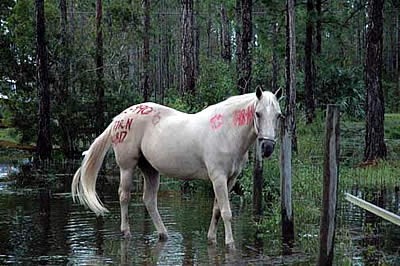Why Horse Owners Need to Be Prepared
Disaster preparedness is important for all animals, but it takes extra consideration for horses because of their size and their transportation needs. It is imperative that you are prepared to move your horses to a safe area.
- During an emergency, the time you have to evacuate your horses will be limited. With an effective emergency plan, you may have enough time to move your horses to safety. If you are unprepared or wait until the last minute to evacuate, you could be told by emergency management officials that you must leave your horses behind. Once you leave your property, you have no way of knowing how long you will be kept out of the area. If left behind, your horses could be unattended for days without care, food, or water.
Horse Evacuation Tips
- Make arrangements in advance to have your horse trailered in case of an emergency. If you do not have your own trailer or do not have enough trailer space for all of your horses, be sure you have several people on standby to help evacuate your horses.
- Know where you can take your horses in an emergency evacuation. Make arrangements with a friend or another horse owner to stable your horses if needed. Contact your local animal care and control agency, agricultural extension agent, or local emergency management authorities for information about shelters in your area.
- Inform friends and neighbors of your evacuation plans. Post detailed instructions in several places – including the barn office or tack room, the horse trailer, and barn entrances – to ensure they are accessible to emergency workers in case you are not able to evacuate your horses yourself.
- Place your horses’ Coggins tests, veterinary papers, identification photographs, and vital information – such as medical history, allergies, and emergency telephone numbers (veterinarian, family members, etc.) – in a watertight envelope. Store the envelope with your other important papers in a safe place that can be quickly reached.
- Keep halters ready for your horses. Each halter should include the following information: the horse’s name, your name, your telephone number, and another emergency telephone number where someone can be reached.
- Prepare a basic first aid kit that is portable and easily accessible.
- Be sure to have on hand a supply of water, hay, feed, and medications for several days for each horse you are evacuating.
- It is important that your horses are comfortable being loaded onto a trailer. If your horses are unaccustomed to being loaded onto a trailer, practice the procedure so they become used to it.
There may be times when taking your horses with you is impossible during an emergency. So you must consider different types of disasters and whether your horses would be better off in a barn or loose in a field. Your local humane organization, agricultural extension agent, or local emergency management agency may be able to provide you with information about your community’s disaster response plans.
